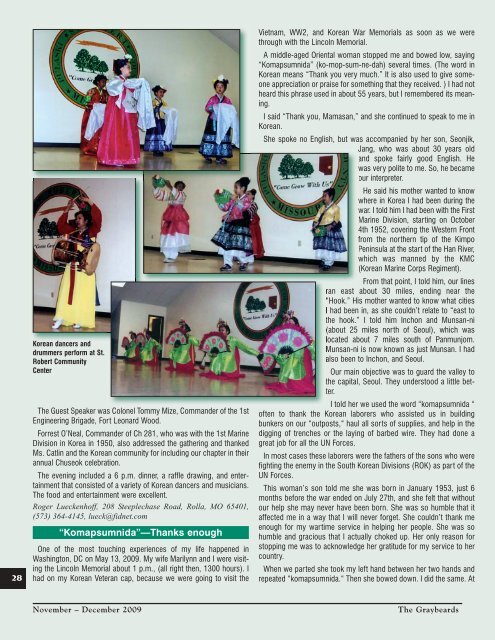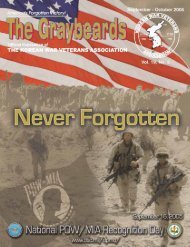gray06 Nov-Dec 2009_Gray01_Jan-Feb 2005.qxd.qxd - Korean War ...
gray06 Nov-Dec 2009_Gray01_Jan-Feb 2005.qxd.qxd - Korean War ...
gray06 Nov-Dec 2009_Gray01_Jan-Feb 2005.qxd.qxd - Korean War ...
You also want an ePaper? Increase the reach of your titles
YUMPU automatically turns print PDFs into web optimized ePapers that Google loves.
28<br />
<strong>Korean</strong> dancers and<br />
drummers perform at St.<br />
Robert Community<br />
Center<br />
The Guest Speaker was Colonel Tommy Mize, Commander of the 1st<br />
Engineering Brigade, Fort Leonard Wood.<br />
Forrest O’Neal, Commander of Ch 281, who was with the 1st Marine<br />
Division in Korea in 1950, also addressed the gathering and thanked<br />
Ms. Catlin and the <strong>Korean</strong> community for including our chapter in their<br />
annual Chuseok celebration.<br />
The evening included a 6 p.m. dinner, a raffle drawing, and entertainment<br />
that consisted of a variety of <strong>Korean</strong> dancers and musicians.<br />
The food and entertainment were excellent.<br />
Roger Lueckenhoff, 208 Steeplechase Road, Rolla, MO 65401,<br />
(573) 364-4145, lueck@fidnet.com<br />
“Komapsumnida”—Thanks enough<br />
One of the most touching experiences of my life happened in<br />
Washington, DC on May 13, <strong>2009</strong>. My wife Marilynn and I were visiting<br />
the Lincoln Memorial about 1 p.m., (all right then, 1300 hours). I<br />
had on my <strong>Korean</strong> Veteran cap, because we were going to visit the<br />
Vietnam, WW2, and <strong>Korean</strong> <strong>War</strong> Memorials as soon as we were<br />
through with the Lincoln Memorial.<br />
A middle-aged Oriental woman stopped me and bowed low, saying<br />
“Komapsumnida” (ko-mop-sum-ne-dah) several times. (The word in<br />
<strong>Korean</strong> means “Thank you very much.” It is also used to give someone<br />
appreciation or praise for something that they received. ) I had not<br />
heard this phrase used in about 55 years, but I remembered its meaning.<br />
I said “Thank you, Mama san,” and she continued to speak to me in<br />
<strong>Korean</strong>.<br />
She spoke no English, but was accompanied by her son, Seonjik,<br />
<strong>Jan</strong>g, who was about 30 years old<br />
and spoke fairly good English. He<br />
was very polite to me. So, he became<br />
our interpreter.<br />
He said his mother wanted to know<br />
where in Korea I had been during the<br />
war. I told him I had been with the First<br />
Marine Division, starting on October<br />
4th 1952, covering the Western Front<br />
from the northern tip of the Kimpo<br />
Peninsula at the start of the Han River,<br />
which was manned by the KMC<br />
(<strong>Korean</strong> Marine Corps Regiment).<br />
From that point, I told him, our lines<br />
ran east about 30 miles, ending near the<br />
“Hook.” His mother wanted to know what cities<br />
I had been in, as she couldn’t relate to “east to<br />
the hook.” I told him Inchon and Munsan-ni<br />
(about 25 miles north of Seoul), which was<br />
located about 7 miles south of Panmunjom.<br />
Munsan-ni is now known as just Munsan. I had<br />
also been to Inchon, and Seoul.<br />
Our main objective was to guard the valley to<br />
the capital, Seoul. They understood a little better.<br />
I told her we used the word “komapsumnida “<br />
often to thank the <strong>Korean</strong> laborers who assisted us in building<br />
bunkers on our “outposts,“ haul all sorts of supplies, and help in the<br />
digging of trenches or the laying of barbed wire. They had done a<br />
great job for all the UN Forces.<br />
In most cases these laborers were the fathers of the sons who were<br />
fighting the enemy in the South <strong>Korean</strong> Divisions (ROK) as part of the<br />
UN Forces.<br />
This woman’s son told me she was born in <strong>Jan</strong>uary 1953, just 6<br />
months before the war ended on July 27th, and she felt that without<br />
our help she may never have been born. She was so humble that it<br />
affected me in a way that I will never forget. She couldn’t thank me<br />
enough for my wartime service in helping her people. She was so<br />
humble and gracious that I actually choked up. Her only reason for<br />
stopping me was to acknowledge her gratitude for my service to her<br />
country.<br />
When we parted she took my left hand between her two hands and<br />
repeated “komapsumnida.“ Then she bowed down. I did the same. At<br />
<strong>Nov</strong>ember – <strong>Dec</strong>ember <strong>2009</strong><br />
The Graybeards

















